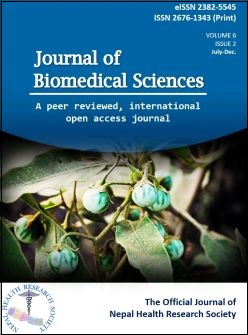Antibacterial effect of Solanum incanum root extracts on bacteria pathogens isolated from portable water in Egerton University, Kenya
DOI:
https://doi.org/10.3126/jbs.v6i2.26813Keywords:
antibacterial, bacteria, pathogens, Solanum incanumAbstract
Background: Contaminated water is a major source of enteric diseases. This study aimed at isolating pathogenic bacteria from portable drinking water in Egerton University. In addition, the study aimed at subjecting the isolates to sensitivity test of root extracts from Solanum incanum besides carrying out minimum inhibitory test of the root extracts.
Material and methods: The bacterial pathogens were isolated from water using membrane filtration. The roots were obtained from Solanum incanum plants in the field and dried at room temperature under shade. The root extracts were obtained using methanol, ethanol and water. Sensitivity test of the isolates to the extracts was carried out using disk diffusion technique. Minimum inhibitory technique was carried out using broth tube dilution technique.
Results: The bacterial pathogens such as Staphylococcus aureus, Bacillus subtilis, Pseudomonas aeruginosa, Escherichia coli and Klebsiella sp. were isolated from the water samples. The crude extracts contained tannins, alkaloids, glycosides, flavonoids, resins, phenols and steroids. There was no significant difference between the zones of inhibition produced by the test bacterial pathogens when subjected to crude extracts obtained using methanol, ethanol and water (F=28.57 P=0.07). However, there was a significant difference between the MIC of methanol, ethanol and water extracts.
Conclusion: Portable water in and around Egerton University is contaminated with potential bacteria pathogens. However, extracts from Solanum incanum can be used as a remedy to the problem. There is need for determination of the structure of active ingredients in the extracts obtained from Solanum incanum.
Downloads
Downloads
Published
How to Cite
Issue
Section
License
This license enables reusers to distribute, remix, adapt, and build upon the material in any medium or format, so long as attribution is given to the creator. The license allows for commercial use.




